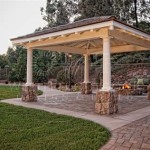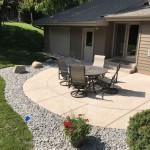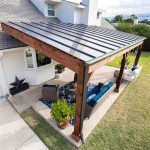Creating a Patio Cover for Your Home: Essential Aspects to Consider
A patio cover is a fantastic addition to any home, extending your outdoor living space and providing protection from the elements. Creating a patio cover requires careful planning and consideration of various factors to ensure a functional and aesthetically pleasing result. Here are some essential aspects to keep in mind:
1. Establish Your Goals and Needs
Before embarking on the design process, it's crucial to clearly define your goals and needs for the patio cover. Determine if you primarily want protection from the sun, rain, or both. Consider how you intend to use the space, whether it's for dining, seating, or entertaining. These factors will help you make informed decisions about the materials, design, and size of your patio cover.
2. Choose the Right Materials
The durability and aesthetics of your patio cover depend heavily on the materials you select. Popular options include:
- Wood: Natural and durable, but requires regular maintenance.
- Vinyl: Low-maintenance and customizable, but can fade over time.
- Metal: Strong and durable, but can be prone to rust if not coated properly.
- Fabric: Provides shade from the sun, but not water resistance.
3. Consider the Design and Style
The design of your patio cover should complement the architectural style of your home and enhance the overall aesthetic appeal. Choose a style that seamlessly blends with the existing structure and outdoor space. Whether you prefer a traditional latticework, a sleek modern canopy, or a customized design, make sure it aligns with your desired ambiance and vision.
4. Determine the Size and Coverage
The size of your patio cover will depend on the area you want to cover. Measure the space carefully and consider the position of the sun to determine the optimal size and placement. Ensure that the cover provides adequate protection from the elements while maintaining a balanced and proportional appearance.
5. Plan for Drainage and Ventilation
Proper drainage and ventilation are essential for the longevity and functionality of your patio cover. Incorporate drainage channels or downspouts to prevent water accumulation, which can damage the structure. Additionally, provide ventilation to allow airflow and prevent moisture buildup, which can lead to mold or mildew.
6. Consider Extension Options
If your patio cover needs to be extended or modified in the future, plan for these possibilities during the design phase. Choose materials and construction methods that allow for easy expansion or alteration, ensuring that your patio cover can evolve with your needs.
7. Seek Professional Advice
Creating a patio cover involves various technical and aesthetic considerations. If you're not confident in your DIY skills or require a customized design, it's recommended to seek professional advice from an architect, contractor, or landscape designer. They can assist with the planning, design, and construction process, ensuring that your patio cover meets all your requirements while enhancing the beauty and value of your home.

How To Upgrade A Patio Cover Screen Room Desert Sun Patios

Spring Screening Lowe S Creative For Your Home Screen Tight

Do It Yourself Screened Enclosure Systems Sample Layouts

15 Pergola Ideas To Make Your Backyard Look Stunning Bored Panda

15 Pergola Ideas To Make Your Backyard Look Stunning Bored Panda

15 Pergola Ideas To Make Your Backyard Look Stunning Bored Panda

Retractable Porch Enclosures Patio

Building Our Screened In Back Porch

Under Deck Ceilings Screenmobile

Home Decor Apartment House Decoration Design Outdoor Patio Ideas Roof Backyard Style
Related Posts








